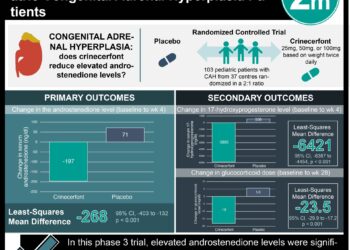Neonatal screening may be effective for salt wasting congenital adrenal hyperplasia
Image: PD
1. Based on Sweden’s nationwide study on congenital adrenal hyperplasia (CAH) screening, investigators were successfully able to identify all infants born with salt wasting disease.
2. The sensitivity for milder forms, particularly in preterm infants, was lower compared to that for the salt wasting CAH.
Evidence Rating Level: 2 (Good)
Study Rundown: Congenital adrenal hyperplasia is mostly caused by mutations in the CYP21A2 gene, resulting in 21α-hydroxylase deficiency. The severity can range from life-threatening salt wasting to signs of excessive androgen levels. Some recent studies have called into question the rationale for screening, while others have reported that salt wasting CAH may be missed. This longitudinal study from Sweden showed that the screening sensitivity for salt wasting CAH was 100%, although the sensitivities were lower for other forms of CAH.
The strength of this study was that it was a nationwide study over a long period. This also poses a problem in analysis since the screening test went through many changes over the time period, and the reported values are from an amalgamation of tests rather than from one test that is currently used. Furthermore, since healthcare is centralized in Sweden, the investigators were able to account for almost all births and standardize their testing. Therefore, their results are not generalizable to a country such as the US, where accounts of births and lab testing are more variable. Lastly, there was no control group in this study, so the merits of screening could not be compared to non-screening.
Click to read the study in JAMA Pediatrics
Relevant Reading: No evidence of an increase in early infant mortality from congenital adrenal hyperplasia in the absence of screening
In-Depth [prospective cohort]: This study examined 2,737,932 infants in Sweden from January 1, 1986 through December 31, 2011. Screening was performed by measuring plasma 17α-hydroxyprogesterone levels, the cutoff level for which has been changed over time. For overall detection of CAH, the sensitivity was 84.3% and specificity was 99.9%. The positive predictive value (PPV) for full-term infants was 25.1% and for preterm infants was 1.4%, and correlated with gestational age (r=0.98; P<0.001). The negative predictive value (NPV) was ~100% for both full-term and preterm infants. The overall positive rate for preterm infants (0.57%) was higher than for full-term infants (0.03%) (P<0.001). For the subgroup of infants with salt-wasting disease, which was the primary endpoint for this investigation, the sensitivity was 100.0%. Sensitivities were lower for the other subgroups such as simple virilizing group (79.7%) and nonclassic disease (32.4%) (P=0.04).
More from this author: Increased hospitalist workload associated with decreased efficiency, COPD associated with increased risk for nonamnestic-mild cognitive impairment, Acetaminophen use during pregnancy associated with increased ADHD-like problems in children, Added sugar intake associated with mortality from cardiovascular disease, Warfarin, antibiotic interactions may not be clinically significant in ambulatory setting
©2012-2014 2minutemedicine.com. All rights reserved. No works may be reproduced without expressed written consent from 2minutemedicine.com. Disclaimer: We present factual information directly from peer reviewed medical journals. No post should be construed as medical advice and is not intended as such by the authors, editors, staff or by 2minutemedicine.com. PLEASE SEE A HEALTHCARE PROVIDER IN YOUR AREA IF YOU SEEK MEDICAL ADVICE OF ANY SORT.




![Weight loss may decrease urinary incontinence in male diabetics [Look AHEAD Study]](https://www.2minutemedicine.com/wp-content/uploads/2014/02/Blue_circle_for_diabetes.svg_-e1379123390777-75x75.png)

